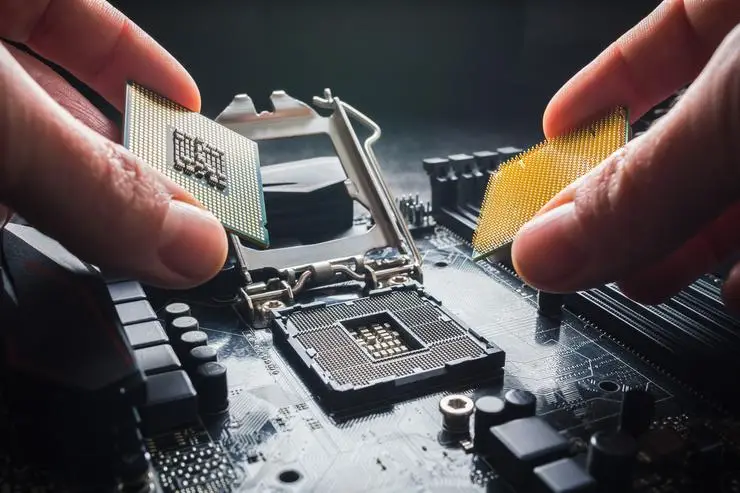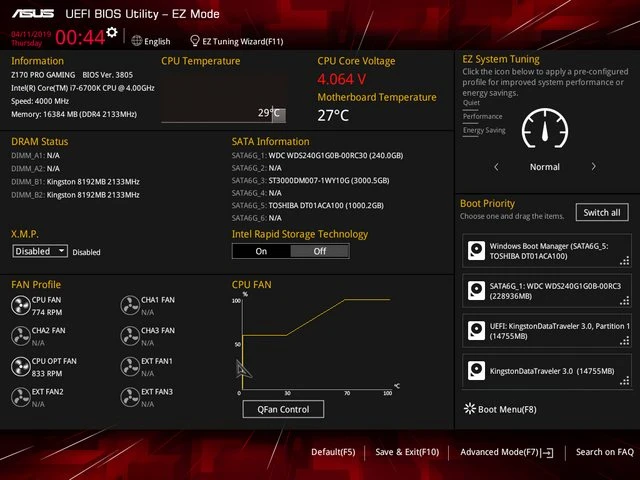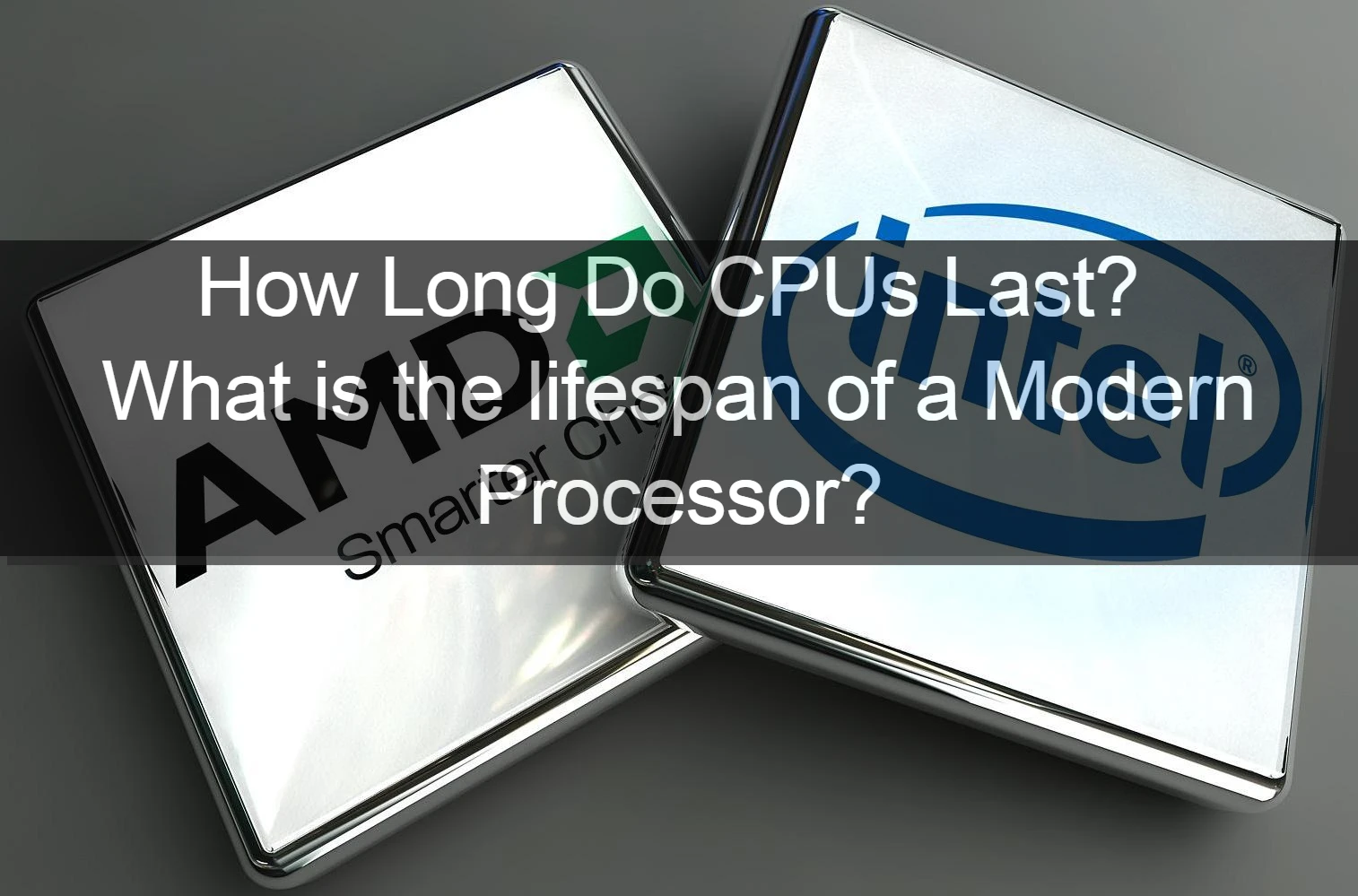Modern processors perform millions of calculations and processes every day. They are the heart of every PC, laptop, streaming console, personal game console, and more. So, How Long Do CPUs Last?
They are always working uninterrupted, but can last for a very long time if the components surrounding them are in good condition.
However, life expectancy of CPUs is a different story. So how long does the processor last? The simple answer is that CPUs usually only work when they are useful to the user.
This article explains why processors last as long as AMD and Intel processors, and some of the ways modern gamers are shortening their processor life.
Table of Contents
A Brief Run-through of Processor Durability
The answer to the question of how long a processor can last depends heavily on the individual use case in which the processor in question is located. But in most cases, they can work for a very long time. Some consumers have reported that some machines have been using the same processor for over 20 years without any problems.
For example, consider an ATM machine. The CPU is exactly like a gaming computer (although it’s not very powerful for obvious reasons), and at the same time it literally runs 24 hours a day, 7 days a week. Some ATMs last for decades before being replaced.
In most cases, we can say that modern processors are obsolete. Gamers today tend to upgrade some of their custom gaming systems every few years as new generations of advanced technology become available. Of course, if your budget allows.
The average user who doesn’t overclock their system, has adequate cooling, and doesn’t clog their case’s fans and filters with dust for long periods of time will likely find their processor to last decades.
A processor has a lifespan of hundreds of thousands of hours, so it can last decades depending on how you use it. Endurance of the processor itself didn’t seem to be an issue for people. The problem lies in the components surrounding the processor, which tend to wear out much faster than the processor itself.
You May Also Like: [Top] 10 Best Stress Test GPU /Benchmarking Softwares in 2022
How Long Do CPUs Last Before You Need To Swap Them?
The answer to this question depends primarily on your specific needs.

Most processors are considered obsolete after 10 years, but video games and other rendering and processing applications require more and more horsepower every day. In addition, the processor itself becomes so fast and efficient that you may need to replace it after only 3-4 years.
More or less, the only consistently reported reduction in CPU life is mismanagement of heat. Excessive heat can slowly wear out all components of your computer, not just your processor. Graphics cards, power supplies, and even SSDs perform better in cooler temperatures.
Less heat means less wear. So by providing proper cooling and good airflow, you can easily extend the life expectancy of all components, including the processor.
RELATED ARTICLE: [Top]8 Best CPU Stress Testing Softwares in 2022
Modern Safeguards Against Thermal Throttling
Decades ago, most processors did not have built-in technology that could shut down when they detected a temperature that exceeded their capacity.
Today, processors have built-in thermal protection procedures that automatically shut down the processor and other components to prevent heating the system.
Prior to these technological advances, the CPU could not be fully lifted unless it was properly cooled. Now, unless your computer has an early 2000s processor, you don’t have to worry about this.
How Long Does An Overclocked CPU Last?
For some time, enthusiasts have believed that overclocking CPUs can significantly reduce their lifespan. However, in the latest use cases, it is determined that this concept should not be a concern.
Most CPUs today are so secure and secure that enthusiasts say they are likely to become unusable before the actual degradation caused by long overclocking processes.
This means that if you want to start overclocking without fear of damaging components or shortening the expected CPU life, it’s definitely possible.
It was possible to implement overclocking protection on both the motherboard and the processor in the same way that engineers implemented intelligent overheating protection on the CPU. These state-of-the-art safeguards prevent voltage and clock speed settings that exceed the technical limits of each chip.
For example, an air-cooled processor that becomes unstable at 4.5 GHz must be shut down and manually restarted. However, in a water-cooled scenario, the same processor can exceed 5 GHz. Because the processor has a cooling function applied, it has technology that can detect that the overclocked processor has not exceeded its maximum operating temperature.
With the average shelf life of modern processors and the rapid development of technology, overclocking shouldn’t be an issue. In almost all scenarios, your processor model will be outdated before you even get close to overclocking damage.
What Are The Effects of Overvolting on CPUs?
The effects of CPU overvoltage are similar to overclocking.

The lower the voltage applied to the processor, the better the results. Likewise, the less overclocked a chip is, the longer it theoretically lasts. The lower voltage generates less heat and therefore less damage to the transistors in the processor. But again, modern gamers change chips so quickly that it doesn’t matter in the long run.
Remember:
The same rules for overclocking a CPU apply to CPU overvoltage.
These days, CPU failure is more likely due to the influence of surrounding components than due to the actual daily “wear out” of the CPU itself.
If you’re already working on overclocking, you’re most likely raising the voltage instead of lowering it, so the answer is the same. Even if you overvoltage the chip and overclock it, it will probably last longer than it needs to because the processor will age faster than it will.
Today, processors are designed to withstand the extra stress consumers place on them in the form of increased clock speeds and voltages. This change gradually became popular as engineers and manufacturers studied consumer habits and decided to give the same users more flexibility.
The fact that engineers are designing only chips for overclocking should tell you everything you need to know about what they think about overvoltages.
YOU MAY ALSO LIKE: What is Optimum Temps for CPU and GPU While Gaming
How Long Do AMD CPU’s Last?
AMD’s own engineers and developers estimate the processor’s shelf life to be at least five years. This seems like a pretty low number at first. However, this number is likely not an accurate reflection of real-world performance and may be significantly underestimated.
AMD processors have a reputation for being hotter than Intel’s in recent years. So cooling AMD processors can reach their maximum potential.
When it comes to overclocking, the biggest difference between AMD and Intel processors is that all AMD chips are unlocked unlike Intel which has specific models of the same chip and some are locked.
AMD processors are known to be easier to use and more responsive to overclocking than Intel chips, making them a natural choice for many overclockers. However, keep in mind that newer generation AMD processors require access to specific motherboard overclocking sockets.
There are many ways to safely overvoltage an AMD chip, but exceeding the recommended voltage limit may not be safe for the chip. For example, the default voltage rating for all modern generation Ryzen processors is 1.3V to 1.4V. For example, setting these chips well above the voltage rating, for example 1.5V or higher, can significantly limit the life expectancy of AMD chips.
How Long Do Intel CPU’s Last?

One interesting difference between AMD and Intel processors is that, unlike AMD, Intel claims their processors have a lifespan of 10 years. This is also an understatement.
Some of the quad-core Intel processors released in 2006 are still in demand today because they are cheap, but they excel in light games like Rocket League and other esports titles.
This performance can be achieved by heavily overclocking these older chips. This is proof that a processor’s sales life isn’t as important as how you feel about it.
With both AMD and Intel processors, if you can reasonably overclock them and cool them efficiently, the claimed longevity of the processors themselves is negligible at best.
RELATED ARTICLE: 8 Best CPUs Under $100 in 2022 for Gaming PC Build
How To Safely Overclock While Maintaining The Shelf Life Of Your CPU
CPU overclocking and overvolting can be tricky and very difficult at first.
There are many software applications that can apply automatic profiles to graphics cards or processors. This allows you to overclock and raise the voltage to some extent.
However, professional overclockers know details such as changing and applying custom voltage settings, BIOS hacks, and effective stress testing while keeping the chip within normal workload and safe temperatures.
We cannot provide all the information here, but safely overbolting and overclocking the processor does not have a measurable impact on processor life.
As long as you have a motherboard that controls temperature and supports severe overclocking, a state-of-the-art processor with fail-safe and preventative measures, and an energy-efficient power supply with reliable performance, the impact I don’t feel it. Processor life.
Keep in mind that adjusting the processor’s operating parameters by adding clock speed and voltage settings puts a lot of stress on the processor and its surroundings, primarily the motherboard and power supply.
If done carelessly, the chips can be fried, which is not easy to do these days. This is thanks to modern processor engineers who go to great lengths to tell the CPU when to turn off power.
Thanks to modern technology, long-term overclocking and overvoltage have no noticeable negative effects if proper cooling is achieved. The average overclocker won’t wreck your CPU in the estimated usage time and may upgrade to the next best option long before you have CPU problems.
Conclusion
Processors are now becoming obsolete, and as a rule, they become obsolete long before they fail. According to AMD and Intel, the processor can be used for 5 to 10 years, but the average user finds it to last as long as it is used.
How long does the processor last? Our final decision is that if you have enough cooling and a reliable power supply and follow the instructions for each component, it will last as long as you need.
- All Crypto Mining Methods: Detailed Breakdown of All

- Bitget Wallet: A Complete Guide for New and Experienced Traders 2025

- Bitget Exchange Review: A Comprehensive Guide to Features, Fees, and Benefits

- How to Create a Download Link: A Complete Guide (Including WordPress)

- 13 Best AI Tools Revolutionizing Daily Life: A Guide to the Best AI Technologies for Everyone

- How to See Specs of PC: A Comprehensive Guide

Recommendation: In-depth guide on Crypto Mining with the advantages and disadvantages. 10 Best Mining Rig Frames For Crypto Mining Setup In 2022 [Top] 8 Best Risers for Mining with Your GPU in 2022 RTX 3060 Ti Mining Profitability Setup in 2022 For effective Crypto Mining Best GPU for mining profit 2022 #Ethereum & #Altcoins Mining (with Pros & Cons) 10 Best Mining Frame /Mining Rig frame for Crypto Mining Setup in 2022 6 Best Motherboard for Ethereum Mining 2022 – Comprehensive Review Recommendation: Monitors to look at; 10 Best Cheap 240hz Gaming Monitors Reviewed By Mr. Wackadoo-Cheapest 240hz Monitors in 2022 7 Best Monitor For Xbox Series X – Fastest Gaming Monitor for Competitive Gamers Recommendation: Games to look at; Top 23 Best AA Games You Should Play Right Away| low budget games pc Top 25 FREE Single Player Games of All Time TOP 24 Open World Best Games on PC Today, Ranked by Mr. Wackadoo Dragon Age 4 release date, story, gameplay, and everything else so far Before the Blood| Announce Trailer| PC debut| Before the Blood Game on Steam— Enter Yes™ Recommendation: RTX graphics card chipset to look at; Best RTX 3070 Graphics Cards of 2021 Top GPUs-Best Graphics Cards for Gaming in 2021–2022 Best 2022 GeForce RTX 3080 Amazon Graphics Cards, Check Out Today’s Best Deal Best Gaming Headsets for PS4 and PS5 in 2022 and beyond List Of Best RGB Keyboards To Buy In 2021 and beyond






